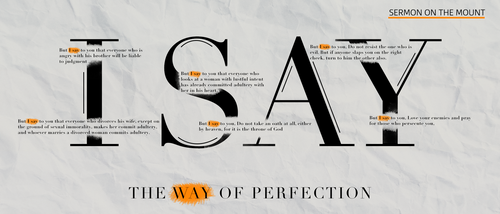Righteousness of the Heart (Day 5)

Grace for the Guilty
"We don't JUST need new habits — we need a new heart. And lucky for us the gospel isn't a 'try harder' gospel... It's a 'trust deeper' gospel."
Romans 3:23-24
"For all have sinned and fall short of the glory of God, and are justified by his grace as a gift, through the redemption that is in Christ Jesus."
Devotional Thought
If this week's journey through Jesus' teaching on heart purity has left you feeling convicted, you're not alone. The Apostle Paul, who wrote much of the New Testament, called himself the "chief of sinners" (1 Timothy 1:15). King David, described as "a man after God's own heart," penned Psalm 51 from the depths of moral failure. Peter, the rock upon which Christ built His church, denied knowing Jesus three times.
The Greek word Paul uses for "fall short" (hustereo) was an archery term describing arrows that don't reach their target. It's not that some arrows get closer than others—they all miss the mark of God's perfect standard. There are no rewards for closer, we either hit the mark or we don't. This levels the playing field dramatically. Whether someone struggles with rage, pride, lust, or greed, all of us stand equally in need of grace.
Here's where the gospel—the good news about Jesus—is radically different from every other religion. Instead of demanding that we clean ourselves up before approaching God, Christianity declares that God approaches us in our mess. The incarnation itself demonstrates this. That's the fancy theological word for God becoming human. Jesus entered our broken world not after we fixed it, but precisely because it was broken.
However, grace doesn't mean God doesn't care about sin. The same Holy Spirit who convicts us of sin also gives us power for change. This creates a tension that many Christians struggle with: How do we take sin seriously without being crushed by guilt? How do we pursue holiness—being set apart for God—without falling into performance-based religion?
The answer lies in understanding the difference between condemnation and conviction. Condemnation says, "You're hopeless and disqualified." Conviction says, "You're loved enough to be changed." The Holy Spirit's conviction always comes with an invitation to repentance—turning away from sin—and restoration. It never comes with a declaration that you're finished.
Pastor David's salt water analogy illustrated sin's deceptive nature. What promises to satisfy us actually makes us thirstier while slowly poisoning our souls. But recognizing this poison isn't meant to drive us to despair. It's meant to drive us to Jesus, the Living Water who alone can truly satisfy.
The Greek word Paul uses for "fall short" (hustereo) was an archery term describing arrows that don't reach their target. It's not that some arrows get closer than others—they all miss the mark of God's perfect standard. There are no rewards for closer, we either hit the mark or we don't. This levels the playing field dramatically. Whether someone struggles with rage, pride, lust, or greed, all of us stand equally in need of grace.
Here's where the gospel—the good news about Jesus—is radically different from every other religion. Instead of demanding that we clean ourselves up before approaching God, Christianity declares that God approaches us in our mess. The incarnation itself demonstrates this. That's the fancy theological word for God becoming human. Jesus entered our broken world not after we fixed it, but precisely because it was broken.
However, grace doesn't mean God doesn't care about sin. The same Holy Spirit who convicts us of sin also gives us power for change. This creates a tension that many Christians struggle with: How do we take sin seriously without being crushed by guilt? How do we pursue holiness—being set apart for God—without falling into performance-based religion?
The answer lies in understanding the difference between condemnation and conviction. Condemnation says, "You're hopeless and disqualified." Conviction says, "You're loved enough to be changed." The Holy Spirit's conviction always comes with an invitation to repentance—turning away from sin—and restoration. It never comes with a declaration that you're finished.
Pastor David's salt water analogy illustrated sin's deceptive nature. What promises to satisfy us actually makes us thirstier while slowly poisoning our souls. But recognizing this poison isn't meant to drive us to despair. It's meant to drive us to Jesus, the Living Water who alone can truly satisfy.
Application Questions
- Guilt vs. Conviction: How can you tell the difference between the Holy Spirit's conviction (which leads to repentance and healing) and condemnation (which leads to shame and despair)? What does each feel like in your experience?
- Performance vs. Grace: In what areas of your spiritual life do you find yourself slipping back into "try harder" mode instead of "trust deeper" mode? How does understanding grace change your approach to spiritual growth?
- Community and Confession: James 5:16 calls us to "confess your sins to one another." How might bringing hidden struggles into the light with trusted believers be part of your healing process? What fears hold you back from this kind of openness?
Today's Challenge
If you've been carrying guilt or shame from past failures, spend time in prayer specifically receiving God's forgiveness. Consider whether there's a trusted friend, pastor, or counselor with whom you could share your struggle for prayer and accountability. Remember: healing happens in community, not isolation.
Today's Prayer
Jesus, I'm grateful that Your standard of righteousness exposes my need while Your grace covers my failure. I confess that I've often tried to earn what You've freely given. I've attempted to achieve what You've already accomplished. Forgive me for the times I've chosen temporary pleasure over lasting joy, immediate gratification over eternal satisfaction. I acknowledge my need for a new heart, not just new habits. Transform me from the inside out by Your Spirit's power. Help me to walk in the freedom You've purchased, neither presuming on Your grace nor doubting it's enough. When I fall, remind me that Your love isn't based on my performance but on Your character. Thank You that the same Jesus who sets the standard also provides the strength to pursue it. In Your precious name, Amen.
Posted in Lust

No Comments